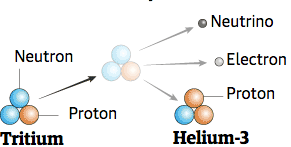In an article titled “In search of the neutrino, ghost particle of the universe,” The Guardian turned to John Updike again.
“Every second,” Robin McKie writes, “billions of neutrinos pass through our bodies. The sun sends trillions streaming across space every minute. Uncountable numbers have been left over from the Big Bang birth of the cosmos 13.8 billion years ago.
 “In fact, there are more neutrinos in the universe than any other type of particle of matter, though hardly anything can stop these cosmological lightweights in their paths. And this inability to interact with other matter has made them a source of considerable frustration for scientists who believe neutrinos could bring new understandings to major cosmological problems, including the nature of dark matter and the fate of our expanding universe. Unfortunately, the unbearable lightness of their being makes them very difficult to study.”
“In fact, there are more neutrinos in the universe than any other type of particle of matter, though hardly anything can stop these cosmological lightweights in their paths. And this inability to interact with other matter has made them a source of considerable frustration for scientists who believe neutrinos could bring new understandings to major cosmological problems, including the nature of dark matter and the fate of our expanding universe. Unfortunately, the unbearable lightness of their being makes them very difficult to study.”
The article notes, “Three different forms of the particle are now known to exist: the electron neutrino, the muon neutrino and the tau neutrino and until relatively recently it was thought that none of them had any mass at all. They were the ultimate in ephemeral ghostliness, a bizarre situation that was celebrated by John Updike in his poem, ‘Cosmic Gall.'”
Neutrinos, they are very small.
They have no charge and have no mass
And do not interact at all.
The earth is just a silly ball
To them, through which they simply pass,
Like dustmaids down a drafty hall
